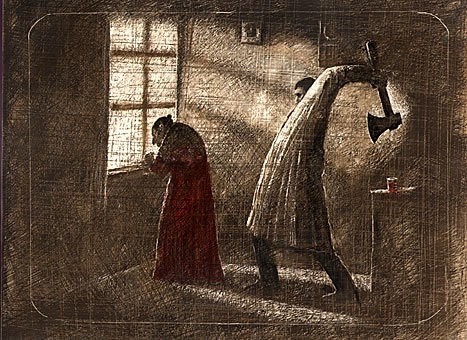“Pain and suffering are always inevitable for a large intelligence and a deep heart. The really great men must, I think, have great sadness on earth.”
Fyodor Dostoevsky, Crime and Punishment
Crime and Punishment piqued my interest more than any book I read last year. It could be the intense prose with which Dostoevsky writes. It could be the psychological impact the book leaves on its reader’s mind. Or it could be the moral dilemma that entails after you find yourself just as muddled as the protagonist himself. I have yet to find out the exact reason why this book impacted me. But, what I’m sure about is that Crime and Punishment is a masterpiece. It doesn’t tiptoe around the idea of beauty, perfection, or romanticism like “The Great Gatsby” or “Anna Karenina.” Instead, This book finds its glory in the somberness and pain of human suffering. So, without wasting more time, the summary and seven convincing reasons to read Crime and Punishment are listed below.
Crime and Punishment:

Crime and Punishment follows a story of a young, handsome but penurious man named Rodian Romanovich Raskolnikov. Raskolnikov lives in a small apartment in Petersburg and relies on his mother and sister for his living expenses. Although poor, Raskolnikov is a learned man who believes in the moral superiority of some men over others. Blinded by his moralistic approach, Raskolnikov kills a voracious pawnbroker woman and her sister( the only witness to the murder). The days following the tragedy are of pain, anguish, redemption, and truth for Raskolnikov. He forges new bonds based on love for some and hatred for others. All while fighting his inner demons.
7 Reasons You Should Read Crime and Punishment:
1. The Realism of Crime and Punishment:
In the nineteenth century, When Russian literature moved from Romanticism to Realism, the greatest masterpiece of the realistic approach, Crime and Punishment by Dostoevsky, came out. Dostoevsky doesn’t bask in the beauty or ethereality of literature like Lermontov or Pushkin. Instead, he focuses on the displeasing and unsightly side of human social order. Dostoevsky successfully ignores the ethereal buildings and magnificent public squares. His focus is on the unruly life of small children, begging and entertaining a crowd for a few Copecks. He focuses on Sonia, a poor, timid girl who becomes a prostitute to support her helpless family. He writes about Raskolnikov, a young, intelligent man who sees no way to support himself and his family apart from committing a murder. The realism glares at the reader throughout the book.
2. The Psyche of Dostoevsky:
There is a reason Dostoevsky is considered the greatest psychological writer of his time. His ability to explore the deepest and dark corners of a human mind and encapsulate everything on a piece of paper is otherworldly. It has been said that while writing Crime and Punishment, Dostoevsky himself was suffering from psychological strain, and he successfully managed to seep his psychology into Raskolnikov’s mind. The character is a masterpiece himself. His anguish and anxiety after committing the murder are pretty eminent throughout the book. Yet his ability to remain composed in front of others and hide his true nature is immaculate.
3. The relatability of the book:
I’m not assuming that this book can become relatable to you and I, because we have a tendency to commit murder. The relatability of this book lies in the pain and anxiety of the characters. Although, Raskolnikov committed the murder basing it on the moral high ground he has over his victims. He keeps justifying his actions to himself throughout the book. The depiction of self-doubt and suffering and the consequences followed by our own decisions can be relatable to any of us.
4. The Confrontation Between Good and Evil:
The book’s main theme is a confrontation between good and evil. The only idea I have depicted about Raskolnikov is of an evil genius. Who finds himself morally superior to everyone else. But the complexities of his characters are far more deepened and can’t just be explained by a single tag you can give him. The truth is that Raskolnikov has more sympathy than many characters, such as Pyotr Petrovich, who is blinded by his wealth and power over others. His compassion is merely an act of superiority. On the other hand, Raskolnikov gave the little money he had to a widow. He looks at Sonia with compassion while others look down on her. Raskolnikov didn’t touch the money he stole from the pawnbroker woman out of shame for his heinous act. A perfect depiction of the confrontation between evil and good.
5. Ulterior Motives Behind Crime and Punishment:
Dostoevsky had many ulterior motives hidden under many themes the book follows. Being born into a religious family, and his reconciliation with Christ during his time in prison. Dostoevsky wasn’t favorable of the movements rising in Russia at that time. He was against atheism, nihilism, and utilitarianism. He addressed the flaws of these movements in Crime and Punishment.
At some point in the book, Raskolnikov confirms to the investigating officer that he believes in God and the idea of heaven. But he was a nihilist who rejected the societal bonds and didn’t believe in existence of “soul” and “mind” beyond a physical world. Yet, during his psychological dilemma he found solace in friendship and love of Sonia and her religious belief. He confessed to the murders to “save” his soul in the afterlife.
Then there was the moral ideology of Hegel. Dostoevsky became acquainted with Hegel’s opinion that all men can be classified into two categories; the mundane individuals bound by the law and the “Heroes” who are above the moral order. We can see that Raskolnikov bears the same ideology. He, too, believes that if a crime is done for a greater cause, it can be justified by the moral high ground. He thought he rid the world of vermin when he killed the old day. But Dostoevsky counters the loophole in Hegel’s ideology by introducing the character of Svidrigailov. He is a murderer himself but isn’t remorseful for his actions like Raskolnikov. Hence, proving Hegel’s concept of extraordinary men is idealistic. Svidrigailov doesn’t feel remorse because his conscience justifies his action. Raskolnikov believed he did society a favor by killing that woman. Yet, fell into a psychological turmoil.
6.The Structure of The Story:
Like every other Russian literature at that tie. Crime and Punishment is written in segments and not holistically. This gives us chance to dwell deeply into the psyche of characters and their background stories. It’s like a collection of mini stories threaded together to create a holistic masterpiece.
7. Characters of Crime and Punishment:
The characters of Crime and Punishment are what make this book extraordinary. The realism with which these characters are written is bound to break a privileged bubble we often live in and be oblivious to the pain and suffering of others. Among these characters are; a young prostitute, a pedophile, a woman who fell into stark poverty, and a companion. Their tales entwined with a complex story of Raskolnikov makes a solid plot with immense shock value.
Conclusion:
In conclusion, Crime and Punishment is a masterpiece written by a great psychological writer Fyodor Dostoevsky. The book follows a story of a young man who commits a murder, believing he has the moral authority to do so. Soon after the murder, his descent into madness starts. His thrilling schemes to get away with the murder intertwined with stories of other people related to him. Makes every page of this book worth a read. The psyche of Dostoevsky at that time is pretty eminent in the story’s protagonist. The characters, structure, relatability, and dark themes of this book are enough to be read and adored by all book lovers!!
I would love to hear your opinions on Crime and Punishment. Comment down below so we can all share our takes and love for Dostoevsky’s novel.

Worth reading.
Good work
I’m glad you liked it.
Pingback: Unraveling Obsession: The Ultimate "Baby Reindeer" Review - Fission Writer - Adventure Travel Blog